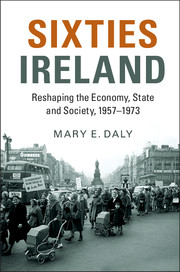Book contents
- Frontmatter
- Dedication
- Contents
- Acknowledgements
- List of abbreviations
- Introduction
- Part I The economy
- Part II Society
- Part III Politics and international relations
- 12 Party politics: the revolution that never happened
- 13 International relations
- 14 Northern Ireland
- Conclusion: abandoning the past?
- Bibliography
- Index
12 - Party politics: the revolution that never happened
from Part III - Politics and international relations
Published online by Cambridge University Press: 05 March 2016
- Frontmatter
- Dedication
- Contents
- Acknowledgements
- List of abbreviations
- Introduction
- Part I The economy
- Part II Society
- Part III Politics and international relations
- 12 Party politics: the revolution that never happened
- 13 International relations
- 14 Northern Ireland
- Conclusion: abandoning the past?
- Bibliography
- Index
Summary
In a 1964 article titled ‘Ireland: the end of an era?’, David Thornley, who combined an academic post in TCD with a broadcasting career in Teilifís Éireann, suggested that recent years had brought ‘a series of novel political factors’. The men who came to prominence when the state was founded were retiring from active politics; it was now acknowledged that maintaining economic growth ‘is the first charge upon political administration’; there was a greater awareness that the state would have to assume a more active role in improving access to education, health and welfare, and the pontificate of John XXIII, meant that the Catholic Church could no longer be seen as a conservative force. Thornley was concerned that Irish politics was incapable of dealing with these changes. There were dangers to democracy if the holders of power lagged behind ‘the instincts of the community’; likewise, ‘if the decision-makers respond more quickly to the challenge of change than the masses … if the mass of the people largely deprived of secondary, technical and university education and congenitally sceptical of their political masters, turns a jaundiced ear to the new rhetoric, democracy in that society does not shatter in revolution. It wanes in political apathy’; ‘as politics becomes less and less concerned with emotional stereotypes and more and more concerned with complex economic issues, it is ever more difficult to communicate its relevance to democracy.’ He was highly critical of the importance attached to ‘ “constituency service” [as] the touchstone of electoral success’, and the difficulty faced by ‘a devoted handful of twentieth-century men [in] the painful, uphill struggle of educating their followers to the realisation that growth-rates and schools are more important than getting a boreen macadammed or fixing a road mender's job’.
One underlying theme in this book is the relative weight of continuity and change, and the capacity of traditional values or vested interests (they can be the same and different) to continue to shape a changing Ireland. These concepts are central to Thornley's argument. He suggested that Irish politicians had to steer a precarious path between Scylla – lagging behind ‘the instincts of the community’ and Charybdis – where the public dismissed ‘the new rhetoric’ of economic growth and modernity.
- Type
- Chapter
- Information
- Sixties IrelandReshaping the Economy, State and Society, 1957–1973, pp. 255 - 296Publisher: Cambridge University PressPrint publication year: 2016

